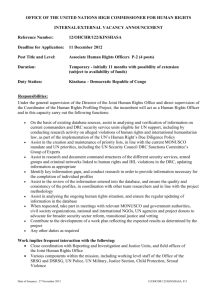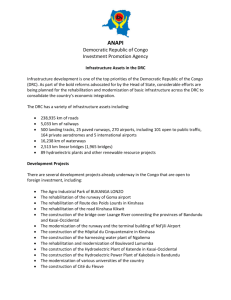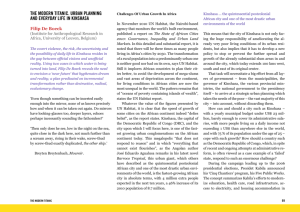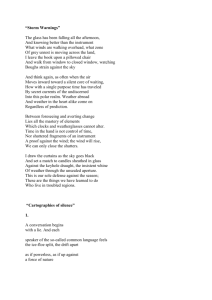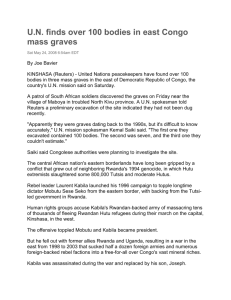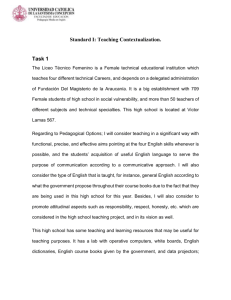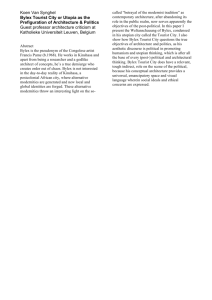Kin la Belle - African Cities Reader
advertisement
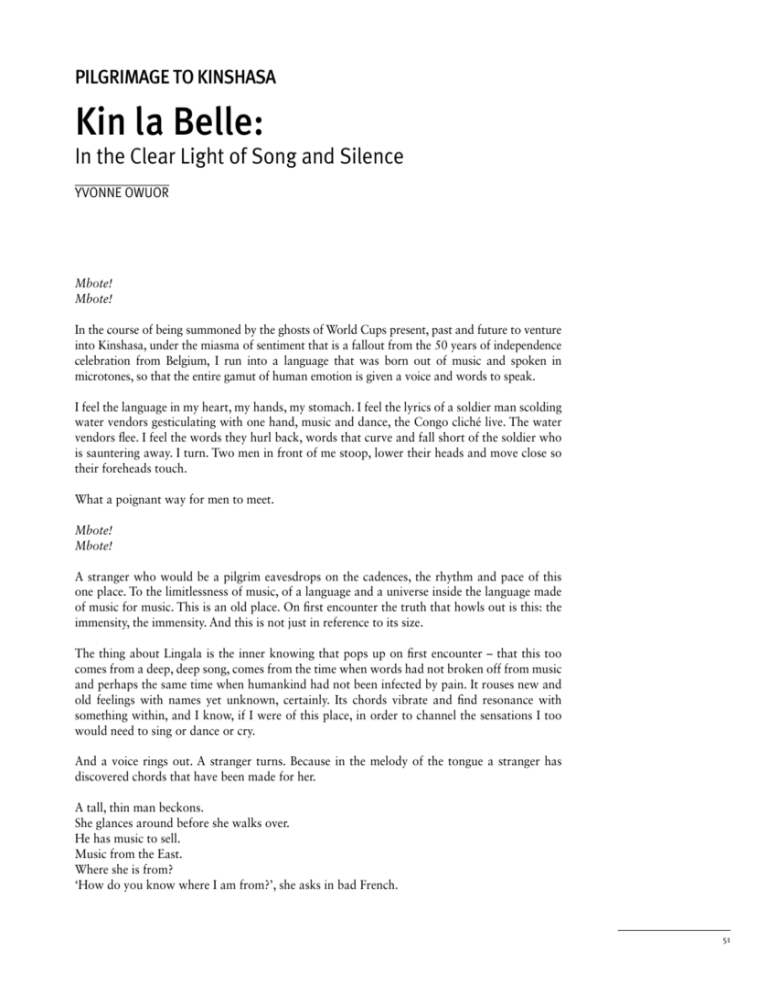
PILGRIMAGE TO KINSHASA Kin la Belle: In the Clear Light of Song and Silence Yvonne Owuor Mbote! Mbote! In the course of being summoned by the ghosts of World Cups present, past and future to venture into Kinshasa, under the miasma of sentiment that is a fallout from the 50 years of independence celebration from Belgium, I run into a language that was born out of music and spoken in microtones, so that the entire gamut of human emotion is given a voice and words to speak. I feel the language in my heart, my hands, my stomach. I feel the lyrics of a soldier man scolding water vendors gesticulating with one hand, music and dance, the Congo cliché live. The water vendors flee. I feel the words they hurl back, words that curve and fall short of the soldier who is sauntering away. I turn. Two men in front of me stoop, lower their heads and move close so their foreheads touch. What a poignant way for men to meet. Mbote! Mbote! A stranger who would be a pilgrim eavesdrops on the cadences, the rhythm and pace of this one place. To the limitlessness of music, of a language and a universe inside the language made of music for music. This is an old place. On first encounter the truth that howls out is this: the immensity, the immensity. And this is not just in reference to its size. The thing about Lingala is the inner knowing that pops up on first encounter – that this too comes from a deep, deep song, comes from the time when words had not broken off from music and perhaps the same time when humankind had not been infected by pain. It rouses new and old feelings with names yet unknown, certainly. Its chords vibrate and find resonance with something within, and I know, if I were of this place, in order to channel the sensations I too would need to sing or dance or cry. And a voice rings out. A stranger turns. Because in the melody of the tongue a stranger has discovered chords that have been made for her. A tall, thin man beckons. She glances around before she walks over. He has music to sell. Music from the East. Where she is from? ‘How do you know where I am from?’, she asks in bad French. 51 It is in the look, the way of standing in the world. It is the way of listening to the sounds you hear. He leans over to add. ‘Here, where you are, it is not always safe to be from the East. To look as you do can bring problems.’ ‘Why?’ ‘The Memories.’ ‘What memories?’ ‘For example, not far from here there was a fire. It was in Masina. There is a shrine to patriotism where there had been a fire. The fire was fuelled by human fat, the remains of the invaders from the East. Like you.’ ‘A correction. I am from the further East.’ ‘Kigali?’ ‘Further.’ ‘Where?’ ‘Nairobi.’ ‘Really?’ ‘Kenya.’ ‘If you say so’ ‘I do.’ ‘Say something in Kiswahili then.’ She stutters. ‘How do I learn Lingala in two weeks?’ He giggles. ‘Ha! If you can tell me you can see the world in music I will tell you that you will learn Lingala soon.’ Did he say see the world in music? ‘Yes. See the world as music. The world is inside music.’ ‘How do you see music?’ Before he laughs he says, ‘Eyes have ears of their own. Try to use them from time to time. An eye can see what it is asked to see. So ask your eyes, I want to see music … they will show you … then you will learn Lingala quickly.” Viewpoints. I think the music man is speaking of viewpoints. A holographic place and from where anyone stands the view is/might be different, the perspective changes, so does the story and the song. Eyes, I want to see music. I am being cautious, terrified of the convenient habit of the single story, which writer Chimamanda Adichie decries so eloquently. That horrible sickness of a sustained single point of view, which never changes, cannot be allowed to change, repeated often enough so it becomes reality. That is not the shame. What is awful is the smallness of the now compromised world that emerges, those stillborn worlds that cannot be born. Worlds are shy things, like baby souls and they need to feel they will be seen and loved just as they are. And when voices clamour and decree that this is what they are and shall always be, these worlds shrink, retreat and cover their faces, afraid of what humankind can do to all the dreams and existences they contain. A music man’s pause. ‘Why are you here from Nairobi?’ ‘To feel Kinshasa, and maybe after, to write the sensations.’ ‘Do you know what you’ll write?’ ‘No.’ ‘Then maybe Kinshasa will tell you something.’ Another pause. 52 Kin La Belle ‘What can I sell you then?’ ‘What do you have?’ ‘Music?’ ‘Joseph Kabasale?’ ‘Why him?’ ‘Independence Cha Cha’ ‘Ah! Nostalgia music.Let me play it so others can hear it. And when we play it let us watch what they will do. And then you can buy it afterwards.’ Independence Cha-cha to zuwiye… Kinshasa cacophonies on the crossroads that is Victoire, and in the blend of so many sounds and the songs in a language, the old song still wields its magic. And we watch hurrying footsteps falter, linger for two, three seconds where Kabasale celebrates. A few pick up the tune beneath their breathing, mouths purse as they take the melody to others, three women – sisters maybe, they are so alike – turn simultaneously to stare, first at the sign above the shop and then at a tall, thin bald headed music man, and a stranger leaning on the door jamb next to him watching them. Kabasalleh summons us all to beginnings, and in the song we can start again. We erase East-West-North-South and those unrepentant fires in Commune Patriotique de Masina are laid to rest for three minutes and six seconds. Kabasale’s melody ends. My Kinshasa seers, my colleagues and companions for this pilgrimage, approach, similar worry lines on their foreheads. Five men of myriad worlds, aligned to Kinshasa in one way or another. It is with and through them that I shall glimpse this place. It is they who have agreed to share my struggle to give word to all our experiencing. These are their names (for now): Claus, Junior, Roger, Kiripi and Patrice, who will leave us after a few days, but only after he has laid down pathways and summoned other wilderness guardians. I attempt mild defiance at their look, and then give up and simply apologise: This was not a deliberate escape attempt. I merely followed the song in a language. This is where it led me to. ‘Listen,’ says the Music man. Again. Independence Cha-cha to zuwiye… In the black car that will become the metaphorical chariot that leads to yet another destination. In my dreams the car will appear, driverless and conscious. And still even in dreams, I will leap in. Show me. I am now being reminded that Lingala, like bitterness in coffee, is but one of four essences that make up the fullness of Kinshasa. There are four national languages here. The other three are Kituba, Tshiluba and Kiswahili. Lingala, I am told has a pain-filled past. It carries many wounds. It was the official language of the hated and mostly diabolic Force Publique, the hand cutting the colonial army that served the whims of the greatest genocidaire of the modern world, Leopald II. Lingala, I am admonished, is suffused with the waters of Congo’s sufferings. Would that explain the texture of the blue note, the microtone in the language? Yvonne Owuor 53 The fifth essence, French, though cherished, applied and used everywhere, is regarded as a bit of a paedophiliac uncle who must be endured because he is family and is also useful. It is the official language, the safe ‘other’ that, officially, is not really inside the national pot but can be jumped into when the national pot gets to boiling point. Viewpoints. After dinner I shall ask about the fires of Masina. A pause. ‘Ah! To quote Marseillaise: “Qu’un sang impur/abreuve nos sillons!” the patriotic murdering is a human habit that gets amplified when it happens here, glorified when it happens elsewhere.’ ‘East Goma is far away from Kinshasa only in geography but not in memory.’ Here. Another echoes… Shame can be Prayed away Danced away Drank away Subjected to amnesia. You too can be a part of our silence. I decline. ‘You don’t have a choice. Now you have heard, and the noise has entered into you. You can be apart from the noise, but the silence, you are in it; you are made of it. The choice was made for you when you noticed.’ ‘How can you live with the silence then?’ A belly laugh. ‘Apnea. Cut off the breathing. Something like that. Cut off the oxygen. It can take time, and sometimes people die of silence. Silence can suffocate to death.’ Listen. I lean forward. ‘Once, there was a man. His name was Godfroid Munongo. One day at a conference, in the middle of his speech, he announced: “It is too much. Tomorrow I will tell you how we killed Lumumba.” And the world waited for the great revelation the next day. But when dawn came, the world found out that during the night, Godfroid had died of cardiac arrest. He died right here in Kinshasa.’ Godfroid was chief of the Bayeke, grandson of Msiri, patriarch of Lumbumbashi, which was the capital of Katanga, chieftain of a state within a state. Katanga is the locale of the sulphuric acid pit where, those in the know say, Patrice Emory Lumumba’s remains were dissolved. ‘Silence has a visual aspect, too. Apart from the pit there is no evidence of the space being different from any other space, except for the silence.’ 54 Kin La Belle Fifty years later, the persistence of the idea that is Patrice Emory Lumumba is evident. Ghosts remain restless when their lives and loves are unrequited. And of their own accord, passing minstrels – has that term been rehabilitated – strike the chords of the Independence Cha-Cha. They sing it to us. We shift in our seats. Silent. And glance at each other. It seems that only I am surprised that the ghosts have so daringly joined us and now have something to contribute to these musings. And this time I listen to the words. The opposite of Kinshasa is Cité du Fleuve. One of my Kinshasa seers, the artist-arts manager Patrice Mukurukeza explains, tongue firmly in cheek. ‘We shall rebuild Kinshasa by moving to the river. We shall have a planned and organised city. Kinshasa will finally escape from Kinshasa.’ Cité du Fleuve/MbokayaEbale will be extricated from the mélange, the bruit, the gnarled cosmoi that have become Kinshasa today. MbokayaEbale will be ordered, clean, formed in lines, painted and face the river, and unlike Kinshasa there will be river viewing equity. That can only be a good thing. I imagine as only a stranger, not even that, a mere pilgrim might. Yvonne Owuor 55
